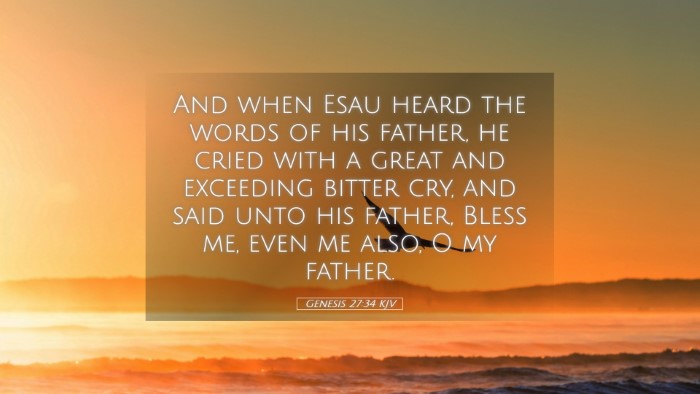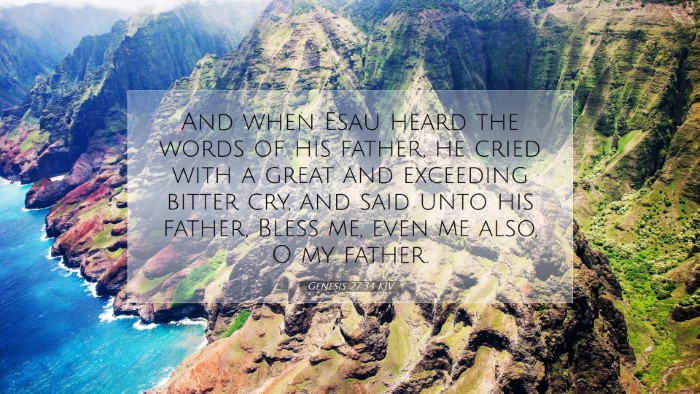Commentary on Genesis 27:34
Genesis 27:34 states:
“When Esau heard the words of his father, he cried with a great and exceeding bitter cry, and said unto his father, Bless me, even me also, O my father.”
This verse captures a moment of profound emotional turmoil and highlights significant theological themes pertinent to both historical context and personal application. Below, we explore insights from several renowned public domain commentaries, providing a multifaceted understanding of this pivotal text.
Contextual Overview
The context of Genesis 27 is critical to understanding the weight of Esau’s plea. Isaac, in his old age, unknowingly blesses his younger son Jacob, who cunningly obtains the birthright and blessing intended for Esau. This switch not only illustrates the dynamics within the family but also reveals divine sovereignty at work in Jacob's life.
Esau’s Emotional Reaction
Esau’s response to his father Isaac’s words is one of intense anguish. The phrase “exceeding bitter cry” captures the depth of his sorrow and despair.
- Matthew Henry notes that Esau’s tears signify the desperate state of a man who realizes the permanent loss of his future inheritance and standing within the family.
- Albert Barnes emphasizes that Esau’s cry was not merely an expression of momentary distress but reflected a profound sense of betrayal and the realization of irrevocable loss.
- Adam Clarke elaborates that Esau’s reaction anticipates a crisis in family relations, emphasizing the consequences of favor and rivalry, and foreshadowing the resentment that festers in familial discord.
Theological Implications
The events surrounding Esau’s loss of blessing reveal deeper theological truths about God’s purpose and human actions.
- Divine Sovereignty: The narrative illustrates that God’s plans often transcend human intentions. Clarke emphasizes that God had ordained that the elder would serve the younger (see Romans 9:12), establishing Jacob as the patriarch despite the means by which it was achieved.
- Human Responsibility: The commentary also underscores the consequences of deception. Henry points out that while God is sovereign, Jacob’s actions were morally questionable and resulted in strife not only between the brothers but also within the family unit.
- God’s Grace: Despite the implications of their actions, the overarching narrative showcases God’s grace. Barnes argues that even in the midst of human failure, God can work towards redemption, hinting at future reconciliation between the brothers.
Application for Today
The narrative invites contemplation on the reality of familial relationships and the weight of choices made in moments of heated passion and desire.
- Understanding Bitterness: Esau’s response is a poignant reminder of how quickly relationships can unravel. Pastors and leaders are encouraged to address bitterness within congregations and families, drawing from Esau’s sorrowful example.
- The Weight of Consequences: The passage serves as a warning about the long-lasting consequences of actions. The pain of Esau’s cry resonates with anyone who has faced betrayal or loss resulting from choices made by others.
- Hope of Reconciliation: The story embodies the possibility of restoration. Just as God worked in the hearts of Jacob and Esau later in life, believers are called to pursue reconciliation and healing, reflecting on the grace that God extends to us.
Conclusion
Genesis 27:34 is a verse that encapsulates tragedy, familial strife, and the enduring hope of grace. It challenges readers to consider the complexities of human emotion, the sovereignty of God, and the powerful impact of our decisions. Engaging with the insights of esteemed commentaries enriches our understanding of this narrative, inviting deeper personal and theological reflection.


